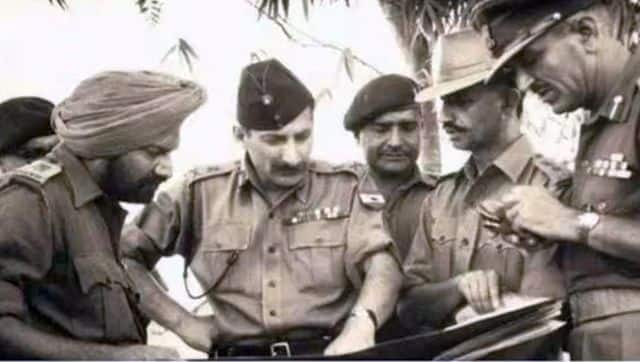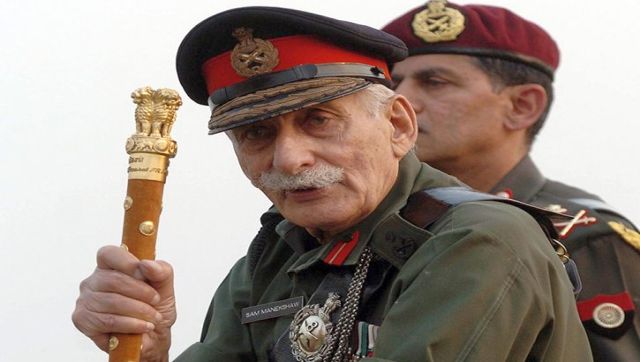The much-anticipated Meghna Gulzar-directed and Vicky Kaushal-starrer – Sam Bahadur has released in theatres and critics are praising the movie and the lead actor for his portrayal of Sam Manekshaw, the inspiration behind the film. But who exactly is Field Marshal Sam Manekshaw – India’s beloved war general, and the subject of the
movie ? We dig deep into the archives and present to you the story of the man and the soldier. Early life of Sam Manekshaw Sam Hormusji Framji Jamshedji Manekshaw, better known as Sam Manekshaw, was born on 3 April 1914 in Amritsar, British India. The fifth of six children, he acquired his school education at Sherwood College, Nainital. Thereafter, he returned to Amritsar for his studies at the Hindu Sabha College. Wanting to follow in the footsteps of his father, Doctor Hormizd Manekshaw, he joined the Indian Military Academy in 1932 and on 22 December 1934, was commissioned into the 4/12 Frontier Force Regiment. Initially, he was sent to Lahore for one year to serve an attachment period with a British unit. Thereafter, in February 1936, he rejoined his parent unit. Interestingly, owing to his birthplace, he was fluent in Punjabi – and often conversed with Sikh soldiers in the language whenever he came across them. Manekshaw met his wife Silloo Bode in 1937 and the two tied the knot, two years later on 22 April 1939 and had two daughters. Manekshaw’s life in the Indian Army Manekshaw, who rose to the rank of Field Marshal in 1973 – he was India’s first – has had a storied career in the Armed Forces. His first brush with action came in 1942 during the Burma War with Japan. He escaped from the jaws of death after he sustained multiple bullet injuries. It was thanks to his orderly Sher Singh that he survived. After the war, Manekshaw became a General Staff Officer (Grade 1) in the Directorate of Military Operations in the run-up to Indian Independence. Post-Partition, Manekshaw, who was a Parsi, was given the option to join either the Indian Army or move to the newly-created Pakistan Army. He chose India and was transferred to the Gorkha Rifles, where he earned the sobriquet Bahadur. It was due to the tumultuous events of Partition that Manekshaw missed his chance to command an infantry battalion, as he was later promoted to brigadier, becoming the first Indian Director of Military Operations. Interestingly, in 1962, his career almost got derailed when he faced a Court of Inquiry on several trumped-up charges against him. At the time, Manekshaw was serving as Commandant of Defence Services Staff College in Wellington. [caption id=“attachment_13450092” align=“alignnone” width=“640”] Field Marshal Sam Manekshaw was a soldier’s soldier. He called his men ‘all my boys’ and the Army wives as ‘all my wives’. File image/PTI[/caption] Many believe and have recounted that the charges against Manekshaw were instigated by then Defence Minister VK Krishna Menon, and certain generals who were close to the political establishment of the time. They weren’t a fan of Manekshaw’s bluntness and honesty. Lt General Daulet Singh, the then GOC-in-C Western Command, presided over the inquiry and exonerated him of all charges. From thereon, he had a relatively smooth sail and was appointed Army chief by PM Indira Gandhi in July 1969. Manekshaw and Indo-Pakistani War of 1971 In the early months of 1971, the clouds of war loomed as the situation in East Pakistan – now known as Bangladesh – worsened. Indira Gandhi, then PM, wanted the Indian Army to enter the fray in order to install a popularly elected government in Dhaka. However, Manekshaw refused to be pushed into hasty action, saying that moving his armour would take time and the advent of the monsoon would turn rivers into oceans. He also stated that the Chinese could not be discounted either. He demanded six-seven months to prepare, during which he drafted a comprehensive strategy. [caption id=“attachment_13450142” align=“alignnone” width=“640”]
 It was Sam Manekshaw who bluntly refused then-Prime Minister Indira Gandhi’s push for a monsoon campaign in East Pakistan. File image/AFP[/caption] It was after this that the Indian Army finally went to war in December of that year, under Manekshaw’s leadership and proved victorious against the Pakistan Army. The war, which only continued for a fortnight, saw more than 90,000 Pakistani soldiers being taken as prisoners of war and ended with Pakistan’s surrender and the resulting birth of Bangladesh as a new nation. Manekshaw was also not a man who hungered for praise. When asked to go to Dhaka and accept the surrender of Pakistani forces, Manekshaw declined, magnanimously saying that the honour should go to his army commander in the East, Lieutenant General Jagjit Singh Aurora.
**Also read: Why aren't Sam Manekshaw's sacrifices, contributions honoured?** Manekshaw’s famous wit and humour But beyond his military mind, there was also a funny and humourous man. During the Burma battle when he was shot multiple times, a doctor refused to initially treat him since he saw little chance of his survival. However, when the surgeon asked what had happened to him, Manekshaw replied: “A bloody mule kicked me.” The surgeon laughed and said: “By jove, you have a sense of humour. I think you are worth saving.” He removed much of Manekshaw’s intestines and stitched him up. There are multiple accounts of his humour. Another instance that will make you chuckle is when he visited the United Kingdom in 1973. At a dinner he hosted for British officers, one of his old commanding officers walked up to him and asked him whether he could address him as Sam now that he had become a Field Marshal. “Please do, Sir,” he replied, “you used to only call me a bloody fool before. At one time I thought that was my Christian name.” [caption id=“attachment_13450162” align=“alignnone” width=“640”]
It was Sam Manekshaw who bluntly refused then-Prime Minister Indira Gandhi’s push for a monsoon campaign in East Pakistan. File image/AFP[/caption] It was after this that the Indian Army finally went to war in December of that year, under Manekshaw’s leadership and proved victorious against the Pakistan Army. The war, which only continued for a fortnight, saw more than 90,000 Pakistani soldiers being taken as prisoners of war and ended with Pakistan’s surrender and the resulting birth of Bangladesh as a new nation. Manekshaw was also not a man who hungered for praise. When asked to go to Dhaka and accept the surrender of Pakistani forces, Manekshaw declined, magnanimously saying that the honour should go to his army commander in the East, Lieutenant General Jagjit Singh Aurora.
**Also read: Why aren't Sam Manekshaw's sacrifices, contributions honoured?** Manekshaw’s famous wit and humour But beyond his military mind, there was also a funny and humourous man. During the Burma battle when he was shot multiple times, a doctor refused to initially treat him since he saw little chance of his survival. However, when the surgeon asked what had happened to him, Manekshaw replied: “A bloody mule kicked me.” The surgeon laughed and said: “By jove, you have a sense of humour. I think you are worth saving.” He removed much of Manekshaw’s intestines and stitched him up. There are multiple accounts of his humour. Another instance that will make you chuckle is when he visited the United Kingdom in 1973. At a dinner he hosted for British officers, one of his old commanding officers walked up to him and asked him whether he could address him as Sam now that he had become a Field Marshal. “Please do, Sir,” he replied, “you used to only call me a bloody fool before. At one time I thought that was my Christian name.” [caption id=“attachment_13450162” align=“alignnone” width=“640”] Apart from being a legendary soldier, Sam Manekshaw also was known for his quick wit and humour. File image/AFP[/caption] There’s also the time when Morarji Desai, the prime minister, had told Manekshaw to give up drinking because it wasn’t good for him. Manekshaw then retorted, “Prime Minister, I come to you and you say don’t drink; I go to party and talk to a pretty girl, my wife wants to know why I’m talking to her; I’m a Field Marshal, is life worth living?” Desai had replied, “Your wife is quite right, pretty girls and drinks will ruin you”. But Manekshaw had the last laugh when he responded by saying they had not ruined him yet! Standing up to the mighty forces Manekshaw was a soldier’s soldier. For him, the Indian Army was a big family; he called the men ‘all my boys’ and the Army wives ‘all my wives’. And no matter what the cost or consequence, he always took it upon himself to keep his ‘family’ happy. His blunt talk had unsettled many in positions of power. A former civil servant PR Chari in a report by The Print, said that Manekshaw had once told a reporter that if he had joined the Pakistan army in 1947, the result of the 1971 war would have been very different. General VK Singh (retired) is of the opinion that it was this incident that angered the government. “Though the government could not take away his rank, it did take away everything else… [and] he was given a salary which was much lower than what he was entitled to”, he said in The Print report. Manekshaw also shared very cold relations with then Defence Minister Jagjivan Ram. The minister had felt that Manekshaw was going over his head, had direct access to the prime minister and had hogged all the limelight after the 1971 conflict. It was because of these incidents that Manekshaw wasn’t given a proper send-off. When he passed away in 2008, neither the prime minister nor defence minister attended his funeral. The army chief at the time was away from the country. But Sam Manekshaw was Sam Manekshaw and it is said that he remained defiant until the very end. His last words before he passed away on 27 June 2008 were ‘I am Okay’. With inputs from agencies
Vicky Kaushal-starrer ‘Sam Bahadur’ has hit theatre screens. The film is based on the legendary life of India’s first Field Marshal – Sam Manekshaw. Known as one of the country’s finest military leaders, he is credited as being one of the architects of the victory in the 1971 war against Pakistan
Advertisement
End of Article


)

)
)
)
)
)
)
)
)



